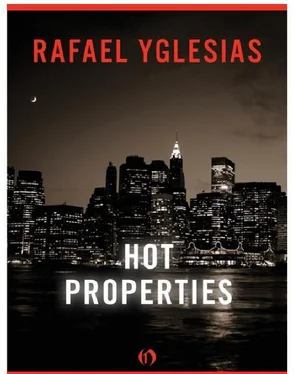There was explosive laugher from the crowd. Someone, away from his area, said to Holder, “Haven’t you told him yet. Bob?” And there was another round of guffaws.
Fred looked up, shocked, at all of them. There was foreknowledge in their reaction to the joke that Fred wouldn’t know if he was writing unless his editor told him. Holder shook his head at the laughter, his eyes closed, his head shaking, a parent irritated by misbehaving children — but a parent who seemed to confess they were right, that their fault was tactlessness, not stupidity. Is that what he had told them? That he had created the book, not Fred?
“I meant …” Fred stammered and most of them suppressed their amusement, looking with exaggerated solemnity at him. He was frozen by the horrible feeling that he had been naked all along and everyone had been too polite to say so.
“I know exactly what you meant,” Paula Kramer said in a kindly soft voice. She addressed the crowd. “It’s the worst feeling in the world. You worry so much about what you’re going to do next.” She returned her glance to Fred and put out a hand sympathetically, touching his knee. “My worst depressions are right after finishing a book. Now you know what postpartum feels like.”
She had covered for him, rewritten everyone’s motivation by misidentifying his confusion. He assumed she had done so consciously, that it was an example of the skillful manipulation of people that the successful always seemed capable of. God, he wished he had that talent. He knew that Paula Kramer would somehow make Holder’s bragging (obviously his editor must be telling everyone he wrote Fred’s book) seem like self-aggrandizement, whereas everything Fred tried, such as his summer tactic of being self-effacing, worked against him. He had abandoned his previous habit of talking about his work to every stranger (having learned that unless you are famous, no one really cares) just when he should have begun such narcissistic ramblings — just when the world would feel he was justified. Now his modesty seemed like incompetence. The summer had been hell, an endless suppression of natural urges, and now it seemed it had been for nothing.
He let his ice cream melt while Holder went on about the idea he had suggested to Fred to write. “Fred’s great at doing contemporary stories. And he’s done great sportswriting, You know,” he said, gesturing to the Town editor for whom Fred was supposed to do his interviews, “I want to get inside the head of a top woman tennis player. Do a novel about, say, Billy Jean King’s life. What a great story!” Holder slapped his leg as though these thoughts were just now coming to him.
There were murmurs of agreement, again the rumble of worry and envy from people who once wouldn’t even have known Fred was there.
“You should do it,” the wife of a bestselling novelist said to Fred. He nodded back at her. Now it was established that it was Holder’s idea. If Fred did it, no matter how well, it would forever be Bob Holder they’d think of as the force that made him. The news brought to him before the party, the utterly amazing information that the Book-of-the-Month Club had picked his novel, that in one swoop his advance had been paid back, that obviously not only would his novel have an ad campaign, but it would be big, all of the various implications that added up to the fact that The Locker Room would make money, guarantee him another contract, probably many more, that he had a real chance to have a bestseller, that he was there at last, out of the dark waters onto the main deck of the luxury liner, strolling in first class— this great moment in his life was sickening, churning in the stomach like rich food wolfed down by a starving peasant.
“He’s hard to take,” Paula Kramer whispered to Fred over the sound of Holder listing the new idea’s commercial potential.
Fred nodded at her stupidly. He couldn’t open his mouth to complain about Holder, afraid somehow he would be caught at it. He felt so grateful to her, that she paid attention to him, that she seemed to be on his side.
“I’d love to read your book,” she said.
“Really?” he blurted out.
“Yes,” she said with a smile. “Do you have a copy you can spare?”
He nodded at the house. “Inside.”
“Great. May I take it before I go?”
“Sure,” he said, and glanced guiltily in Holder’s direction — as though by agreeing he was cuckolding his editor.
“Terrific,” she said, and winked at him like a conspirator.
Fred straightened and breathed deeply, glancing at the purple rays of the dying sun. He felt someone watching him and turned his head away from Paul to meet Marion’s eyes. She was staring at him like a stranger — an enraged, murderous stranger.
Tony laughed. Every few minutes he’d burst out laughing. He prowled the apartment with more and more energy, fed by pleasure at contemplating the wonderful farcical payoff to his life. First Garth had called. Tony had been seated sullenly in his study staring at the last scene of his play, hating it, hating it fiercely. His life, for months, had been nothing. He sent Betty off alone to the publishing cocktail parties she now attended with increasing frequency. He spent virtually all his time in the apartment trying to work on the play, taking out comic scenes and replacing them with hard drama. He hated it, he thought it read like a television movie, but he was furious at the world, convinced no one had any taste and that this sort of obvious, heavy-handed dialogue would be praised. He read Sherlock Holmes mysteries over and over, delighted by their comfortable predictability. He watched the television talk shows faithfully, staring at the parade of second-rate actors and pompous authors with slow-burning rage. Into this well of lonely despair Garth phoned, and the first sign of a rope to lift him up and out into the blue sky appeared: “Tony? How ya doin’?”
“Hi …” He had been slumped in his chair, glowering at the words on the page stuck in the typewriter. He sat up, at attention, as though the principal had walked into the classroom.
“I’m sorry I haven’t called,” Garth on. His voice was excessively cheerful, hurried. “Guess I was too upset that you didn’t want to continue with the project.”
“Uh, that’s okay. How’s it going?”
“Not going at all. That’s why I’m calling. I reread your draft last week — been meaning to call. There’s a lot of great stuff in it, Tony. I think we underrated it.”
“I didn’t. I overrated it.”
Garth laughed, a quick, studied chuckle, and then hastened on: “I mean Jimmy and me. I’d really like ya to come back on — do a rewrite. Do it your way. Just give me a little more resonance, try to play down the politics. Maybe give me a friend in the script that I can play off — express some of my confusion about Meryl’s character.”
God, they were still talking about Streep, as though she would ever play this part now that she had become a box-office star on her own. She’d never play second fiddle to this shrimp. “Uh, I … I haven’t thought about it. I really thought you hated the script—”
“No, no! Look, I’m famous for being a scumbag to writers. Ask anybody.” Garth laughed. No doubt he suffered from the delusion that admission of a fault meant it wasn’t a serious one. “Your draft is better than anything we’ve gotten. By a long shot. It’s just a tough story to get right, but the great ones always are. You have to understand this business is a collaboration. Maybe you were a little too sensitive about taking notes. You gotta consider that possibility too. We’ll try harder — both of us — this time to communicate more and argue less.”
“What about Foxx? Does he want me back on?”
Читать дальше












